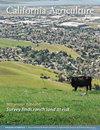免耕高粱和鹰嘴豆产量达到或超过标准耕作产量
IF 1.1
4区 农林科学
Q2 AGRICULTURE, MULTIDISCIPLINARY
引用次数: 2
摘要
为了满足加州《可持续地下水管理法》的要求,迫切需要减少对地表水和地下水灌溉依赖的作物生产策略。提高农业用水效率的一个策略是减少耕作和保持土壤表面的残留物。我们评估了在圣华金河谷有和没有覆盖作物的高残留免耕与标准耕作4年对garbanzo和高粱两种作物产量的影响。免耕处理不进行一次或二次耕作。免耕和标准耕作制度下高粱产量相近,免耕鹰嘴豆产量与标准耕作相当或超过标准耕作,具体年份不同。覆盖作物对作物产量没有影响。免耕有覆盖作物制度下土壤覆盖度最高,平均为97%,而标准耕作无覆盖作物制度为5%。我们的研究结果表明,在圣华金河谷,鹰嘴豆和高粱可以在免耕的情况下种植,而不会损失产量。本文章由计算机程序翻译,如有差异,请以英文原文为准。
No-tillage sorghum and garbanzo yields match or exceed standard tillage yields
To meet the requirements of California's Sustainable Groundwater Management Act, there is a critical need for crop production strategies with less reliance on irrigation from surface and groundwater sources. One strategy for improving agricultural water use efficiency is reducing tillage and maintaining residues on the soil surface. We evaluated high residue no-till versus standard tillage in the San Joaquin Valley with and without cover crops on the yields of two crops, garbanzo and sorghum, for 4 years. The no-till treatment had no primary or secondary tillage. Sorghum yields were similar in no-till and standard tillage systems while no-till garbanzo yields matched or exceeded those of standard tillage, depending on the year. Cover crops had no effect on crop yields. Soil cover was highest under the no-till with cover crop system, averaging 97% versus 5% for the standard tillage without cover crop system. Our results suggest that garbanzos and sorghum can be grown under no-till practices in the San Joaquin Valley without loss of yield.
求助全文
通过发布文献求助,成功后即可免费获取论文全文。
去求助
来源期刊

California Agriculture
农林科学-农业综合
CiteScore
2.40
自引率
7.70%
发文量
17
审稿时长
>12 weeks
期刊介绍:
Information not localized
 求助内容:
求助内容: 应助结果提醒方式:
应助结果提醒方式:


